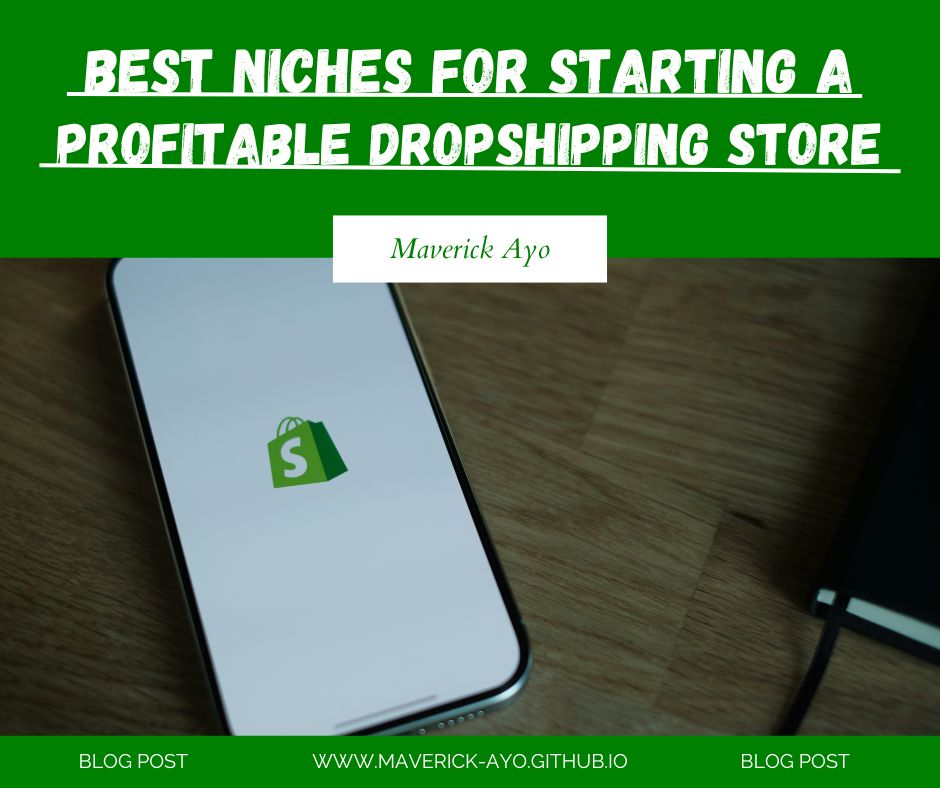
Best Niches for starting a profitable dropshipping store.
 by Maverick Ayo .jpg)
Have you been dreaming of starting your own online business but feel overwhelmed by all the options, tools, and strategies? You’re not alone. Many aspiring entrepreneurs face the same challenges when stepping into the digital marketplace. The good news is that you don’t need to be a tech genius, have a business degree, or spend thousands of dollars to launch a successful online business. With the right approach and mindset, anyone can build a profitable business from scratch.
In this comprehensive guide, we will break down the essential steps to help you start an online business that not only survives but thrives, even if you are a complete beginner.
The foundation of a profitable online business is a solid idea that solves a real problem or fulfills a specific need. Begin by identifying your passions, skills, and market demands. Research trending niches, but focus on areas where you can provide unique value or expertise. Popular online business models include e-commerce stores, digital products, freelance services, online courses, and affiliate marketing.
Use free tools like Google Trends, keyword planners, and social media to gauge demand and competition. Narrowing down your business idea helps you target the right audience and increases your chances of success.
Before investing time and money, validate your business idea to ensure there’s a paying audience. Create a simple landing page or social media profile to showcase your product or service and gather feedback. Offering a pre-sale, free trials, or surveys can help test interest and fine-tune your offering based on real customer insights.
Validation minimizes risks and sets a strong foundation for growth by confirming that people want what you plan to sell.
Your website is your online storefront and a key asset for building trust and credibility. Choose user-friendly platforms like WordPress, Shopify, or Wix that require little to no coding knowledge. Design your site with a clean layout, clear navigation, and mobile responsiveness, as most users access sites via mobile devices.
Make sure to include essential pages such as Home, About, Products or Services, Blog, and Contact. Optimizing your website for search engines (SEO) by using relevant keywords in titles, headers, and meta descriptions will help drive organic traffic and improve your visibility on Google.
Content is king in the digital world. Creating valuable, informative, and engaging content attracts visitors and builds authority in your niche. This could be through blog posts, videos, podcasts, or social media updates. Focus on answering your target audience’s questions and solving their problems.
Regularly publishing content not only improves your SEO but also establishes trust and encourages visitors to return and eventually make purchases.
Social media platforms provide excellent opportunities to reach and engage your audience. Identify which platforms your customers use most and create consistent, authentic content tailored for each channel. Engage with followers by responding to comments and messages, running contests, and sharing testimonials.
Email marketing remains one of the most effective ways to nurture leads and convert prospects into paying customers. Build an email list by offering valuable incentives such as free guides or discounts, and send regular newsletters with personalized, relevant content.
Exceptional customer service sets profitable businesses apart. Be responsive, transparent, and proactive in addressing customer questions or concerns. Collect feedback through reviews, surveys, and direct communication to continuously improve your products or services.
Positive customer experiences generate repeat business and word-of-mouth referrals, both of which are essential for sustainable growth.
Use analytics tools like Google Analytics and social media insights to track your website traffic, user behavior, and marketing performance. Analyze which strategies are driving sales and which need adjustment. Continuously optimize your website, content, and marketing efforts to improve conversion rates and profitability.
Staying data-driven allows you to make informed decisions, scale effectively, and adapt to changing market trends.
Starting a profitable online business as a beginner is entirely achievable with the right mindset, planning, and execution. Begin with a clear, validated business idea, build a professional website, create valuable content, and connect authentically with your audience through social media and email marketing. Prioritize excellent customer service and use data to refine your strategy over time.
Success doesn’t happen overnight, but with consistency and a commitment to learning, your online business will grow and thrive in the digital marketplace.
A beginner can start an online business by choosing a profitable niche, creating a simple website or store, using free tools like Canva for branding, and promoting on platforms like Pinterest, TikTok, or Facebook. Start small, focus on value, and scale with what works.
Dropshipping, affiliate marketing, content creation, and selling digital products are the easiest online businesses to start with little or no money. These models don’t require inventory or high startup costs, making them ideal for beginners.
To choose a profitable niche, look for topics people search for often, that solve problems, and that have clear products or services attached. Use tools like Google Trends or AnswerThePublic to find hot, evergreen niches with low competition.
It can take a few weeks to several months to make money from an online business. Success depends on your niche, marketing efforts, and how consistent you are. Most beginners start seeing results after 1–3 months of focused effort.
While not always required, having a website builds trust, showcases your brand, and helps you attract traffic from Google. You can start with free tools like GitHub Pages, WordPress, or Shopify Lite if you're on a tight budget.